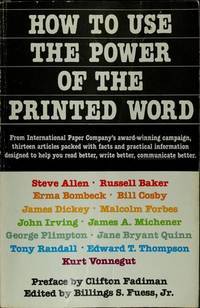Write With Style
Newspaper reporters and technical writers are trained to reveal almost nothing about themselves in their writings. This makes them freaks in the world of writers, since almost all of the other ink-stained wretches in that world reveal a lot about themselves to readers. We call these revelations, accidental and intentional, elements of style.
These revelations tell us as readers what sort of person it is with whom we are spending time. Does the writer sound ignorant or informed, stupid or bright, crooked or honest, humorless or playful --- ? And on and on.
Why should you examine your writing style with the idea of improving it? Do so as a mark of respect for your readers, whatever you're writing. If you scribble your thoughts any which way, your readers will surely feel that you care nothing about them. They will mark you down as an egomaniac or a chowderhead --- or, worse, they will stop reading you.
The most damning revelation you can make about yourself is that you do not know what is interesting and what is not. Don't you yourself like or dislike writers mainly for what they choose to show you or make you think about? Did you ever admire an emptyheaded writer for his or her mastery of the language? No.
So your own winning style must begin with ideas in your head.
[...]
In Sum:
1. Find a subject you care about 2. Do not ramble, though 3. Keep it simple 4. Have guts to cut 5. Sound like yourself 6. Say what you mean 7. Pity the readers
Notes:
Taxonomies:
/business and industrial (0.677017)
/art and entertainment/visual art and design/drawing (0.499688)
/hobbies and interests/reading (0.496401)
Keywords:
Style Newspaper reporters (0.928147 (neutral:0.000000)), readers (0.767840 (positive:0.003969)), damning revelation (0.709154 (neutral:0.000000)), ink-stained wretches (0.705861 (negative:-0.225189)), technical writers (0.682728 (neutral:0.000000)), emptyheaded writer (0.643703 (positive:0.384957)), writing style (0.633055 (positive:0.389172)), winning style (0.629799 (positive:0.522704)), revelations (0.552423 (positive:0.260416)), egomaniac (0.488314 (negative:-0.655286)), ignorant (0.484432 (negative:-0.755145)), freaks (0.473028 (neutral:0.000000)), guts (0.468709 (negative:-0.490622)), sort (0.466042 (positive:0.260416)), Pity (0.465662 (negative:-0.742066)), Sum (0.465360 (neutral:0.000000)), elements (0.464219 (neutral:0.000000)), mastery (0.463662 (positive:0.384957)), writings (0.463661 (neutral:0.000000)), respect (0.463333 (positive:0.714777)), idea (0.459532 (positive:0.389172)), time (0.458398 (positive:0.260416)), chowderhead (0.457974 (negative:-0.655286)), thoughts (0.457628 (neutral:0.000000)), way (0.457563 (neutral:0.000000)), person (0.457544 (positive:0.260416)), subject (0.454956 (neutral:0.000000)), language (0.453366 (positive:0.384957)), ideas (0.452647 (positive:0.522704))
Entities:
writer:JobTitle (0.755440 (negative:-0.335895))
Concepts:
Writing (0.945000): dbpedia | freebase | opencyc
Creative writing (0.645473): dbpedia | freebase | yago
Writing process (0.554375): dbpedia | freebase
Style guide (0.524072): dbpedia | freebase
Writer (0.522637): dbpedia | freebase | opencyc
Journalism (0.462190): dbpedia | freebase
Thought (0.431347): dbpedia | freebase | opencyc
Technical communication (0.367678): dbpedia | freebase





